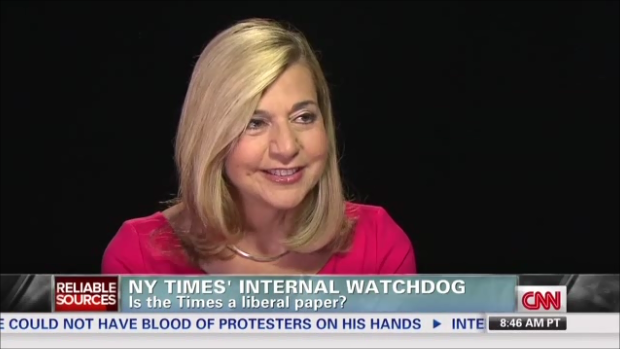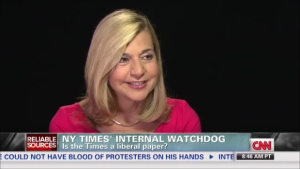NY Times Public Editor Gives Journalism Students Advice—Fairness Over Objectivity

New York Times public editor Margaret Sullivan gave her students at the Columbia Graduate School of Journalism some advice last week based on what she’s learned in the last three decades, since she entered the field:
- About social media.
• No road rage; walk away from the keyboard.
• Be useful.
• Be responsive.
• Be willing to correct and acknowledge errors immediately.
• Show restraint; remember that you are posting to The World. Forever.
• Try for a mix of 20 percent fun and 80 percent hard information.
• Read every link before re-tweeting or re-posting.
• It’s a tool, not an end in itself. - About journalism.
• Don’t cut corners. Do the actual work.
• If you “borrow,” always credit with a link and a specific mention, and always write in your own words.
• You can lose your reputation and your career in an instant.
• Despite that, don’t be timid. Be brave; just don’t be brave and stupid.
• Ask for advice from smart people.
• Do the work that improves the world, even in a small way.
• Don’t sink to least-common-denominator journalism.
• A little snark goes a long way.
• Think more about fairness than objectivity.
• Think about how close you can get to the truth.
• Put yourself in the place of the people who will be affected by your work. That doesn’t mean to pull your punches.
• Be rigorous. Go the extra mile. If you think you should interview five people, interview 10. Fact-check with a vengeance.
• Be aggressive — a passive journalist isn’t really a journalist.
• Get to be really good at one or two things. And get to be decently good at a whole bunch of things. (A hat tip to my friend Drake Martinet of Vice Media here.)
• If you screw up, apologize fully and move on.
• Try to work for someone great.
• Whatever help you’ve received in your career, pay it forward.
• Be idealistic. Resist cynicism.
• Never be boring — be engaging and clear, especially when the subject is complicated or hard to understand. If you’re writing blurry stuff, maybe you don’t understand the subject yet. Pity the readers (or viewers) and consider their attention span. (E.B. White on clarity, referring to his teacher William Strunk: “Will felt that the reader was in serious trouble most of the time, a man floundering in a swamp, and that it was the duty of anyone attempting to write English to drain this swamp quickly and get his man up on dry ground, or at least throw him a rope.”)
• You are not in this business for the money, so what are you in it for? Do that work.
Overall, Sullivan gives some solid advice, particularly in using social media. But a couple of things caught my eye in her journalism advice to the students.
Sullivan tells the students to fact-check with a vengeance, but never mentions the word accuracy. Maybe she thinks it’s a given, but way too often the media today fail to strive for accuracy, though they obviously should.
Sullivan also puts fairness over objectivity rather than telling the students they should try to be both fair and objective.
And we wonder what’s wrong with journalism today?
Don Irvine is the chairman of Accuracy in Media and Accuracy in Academia.





